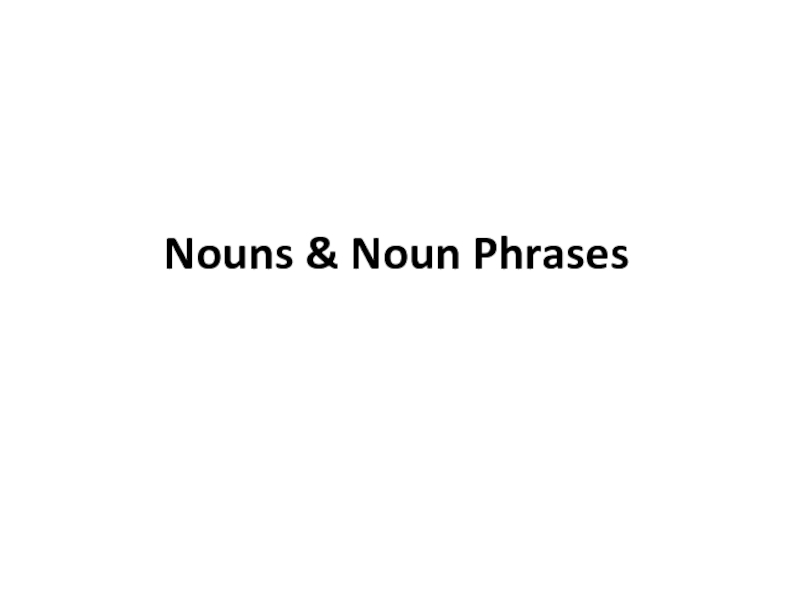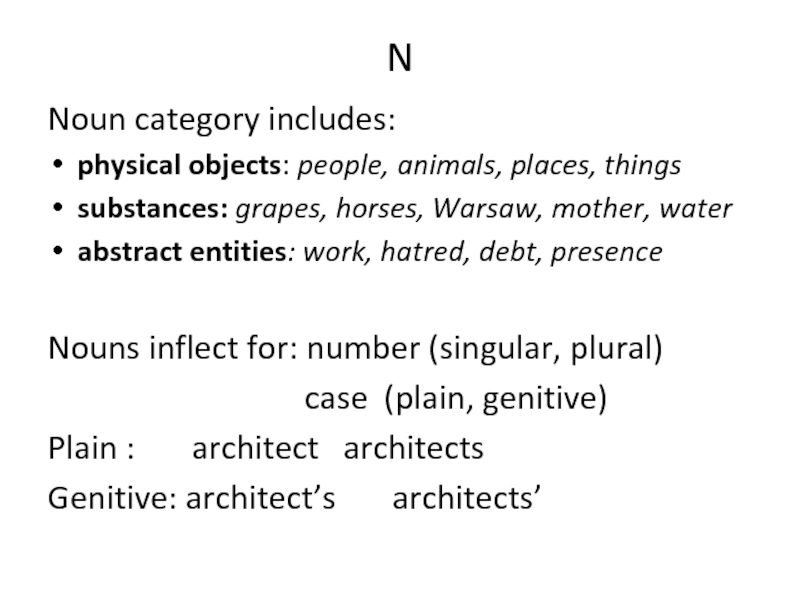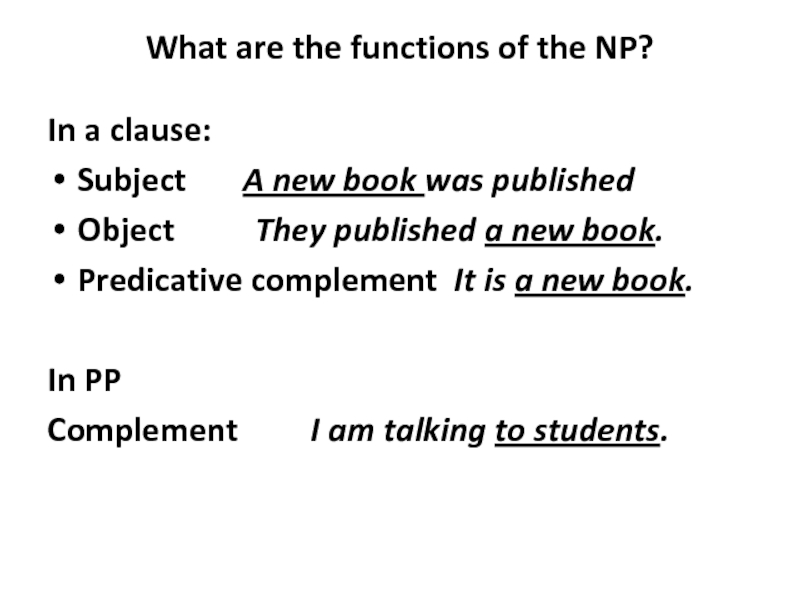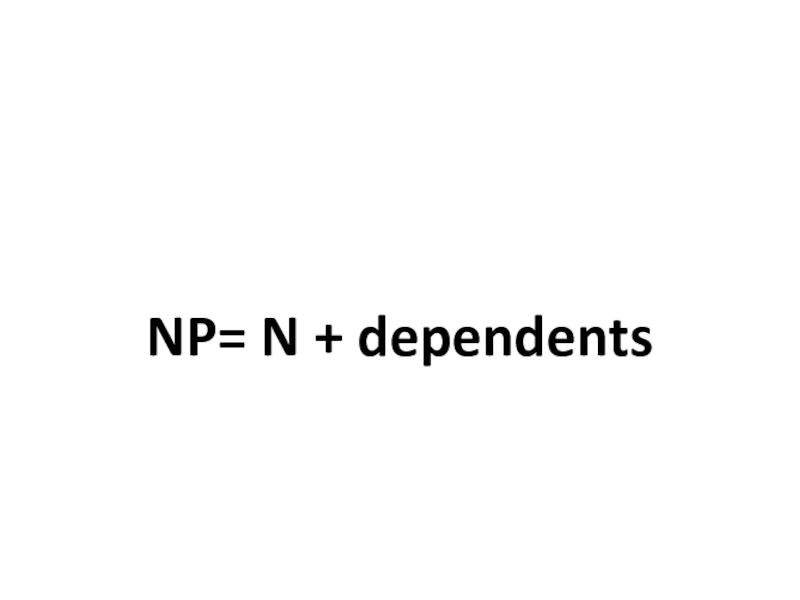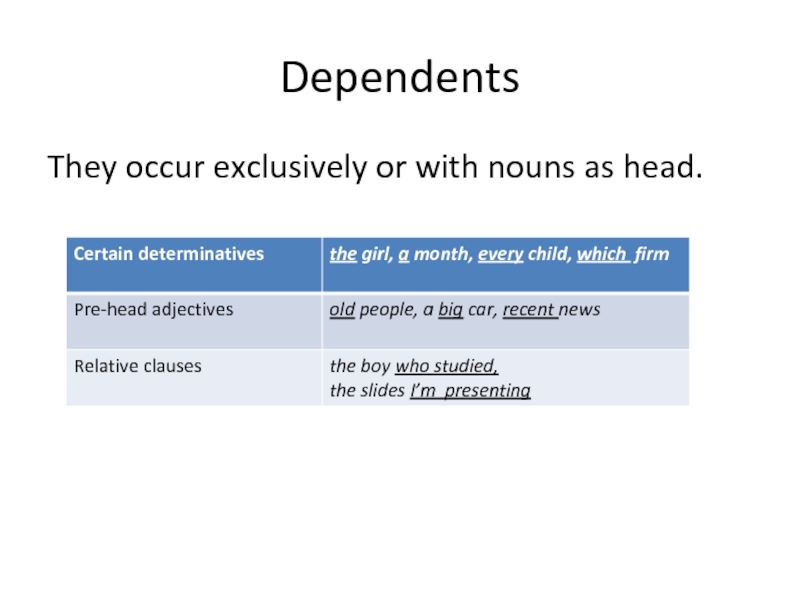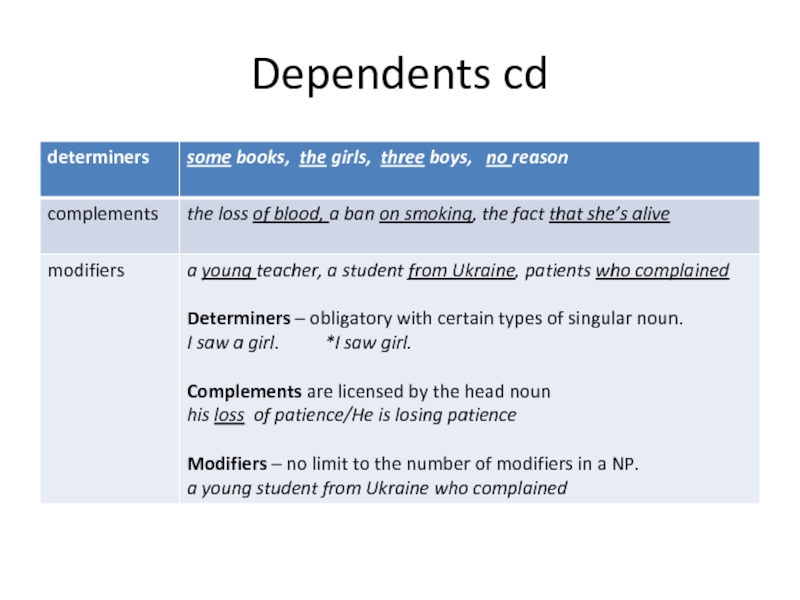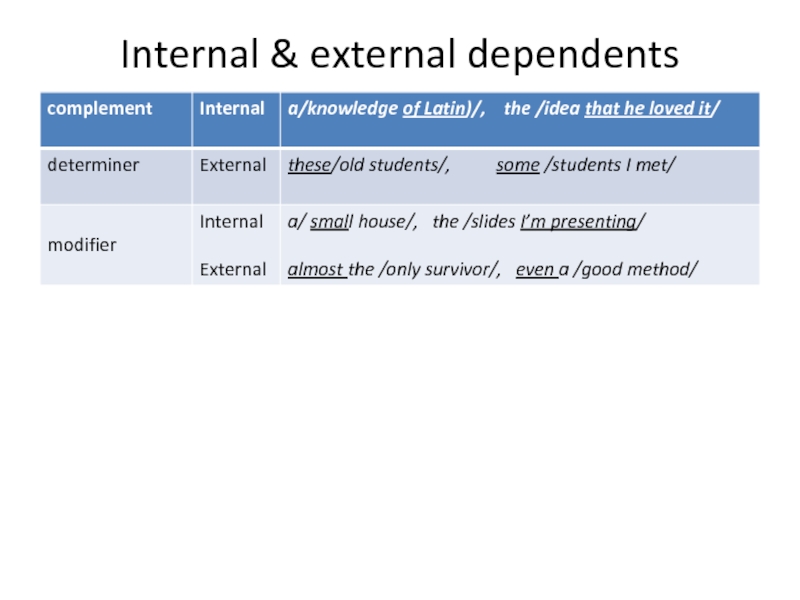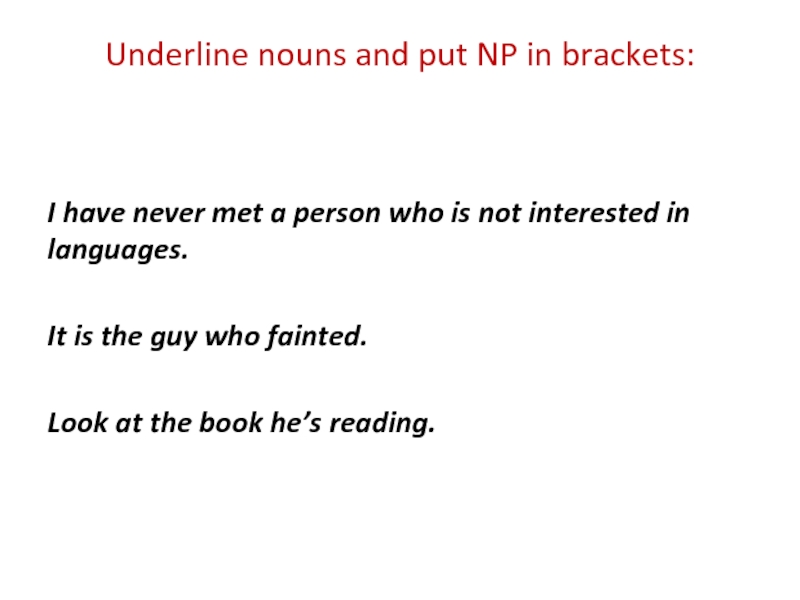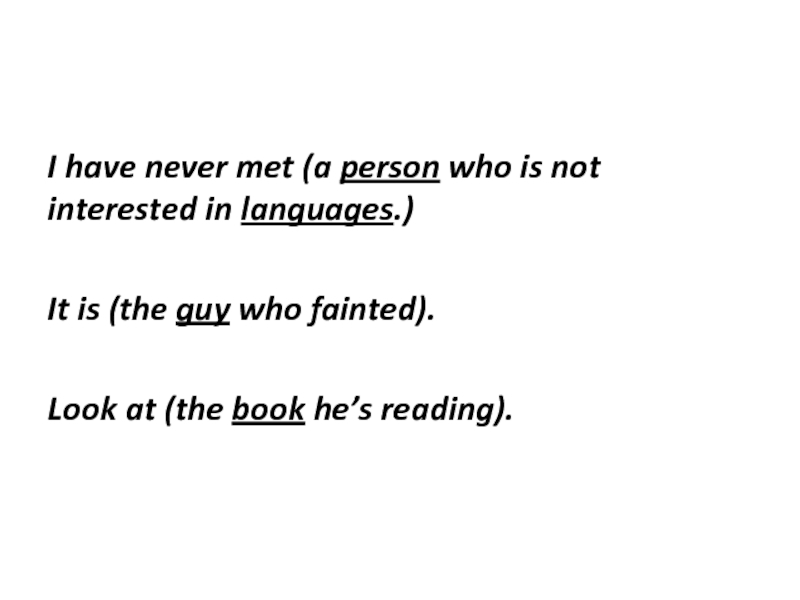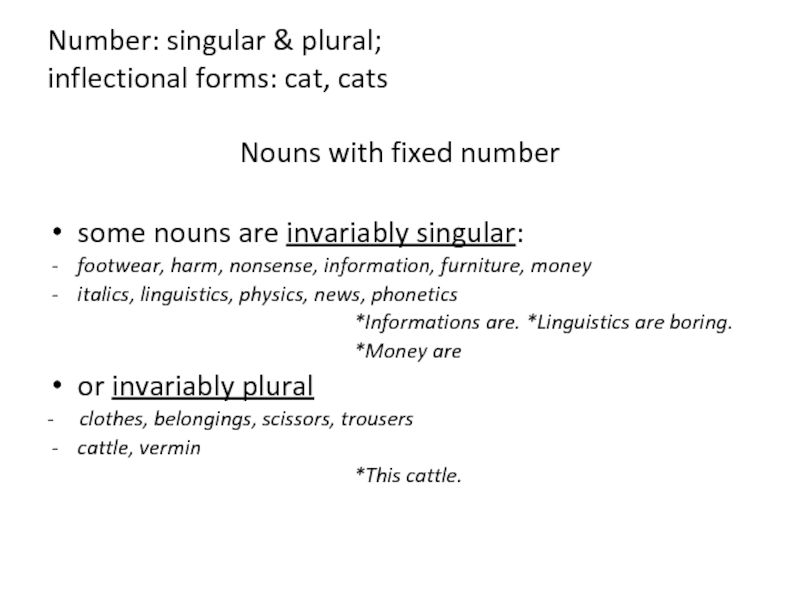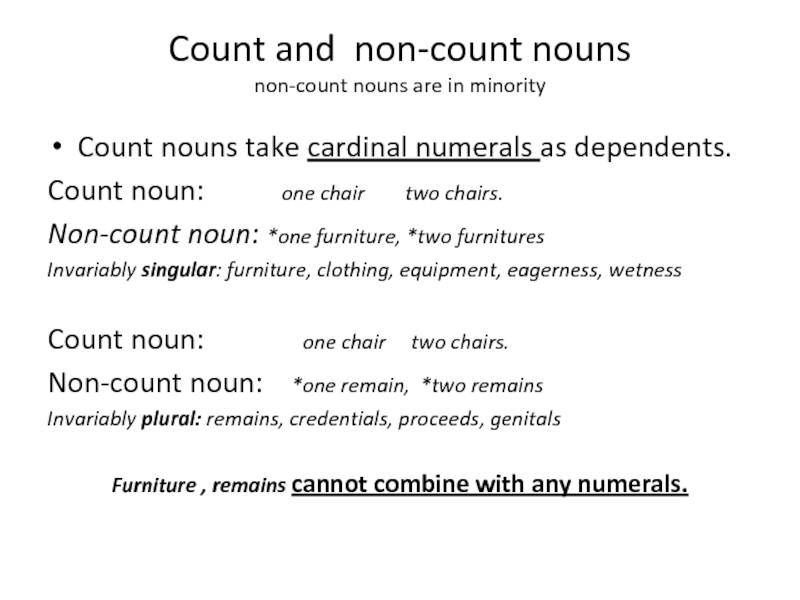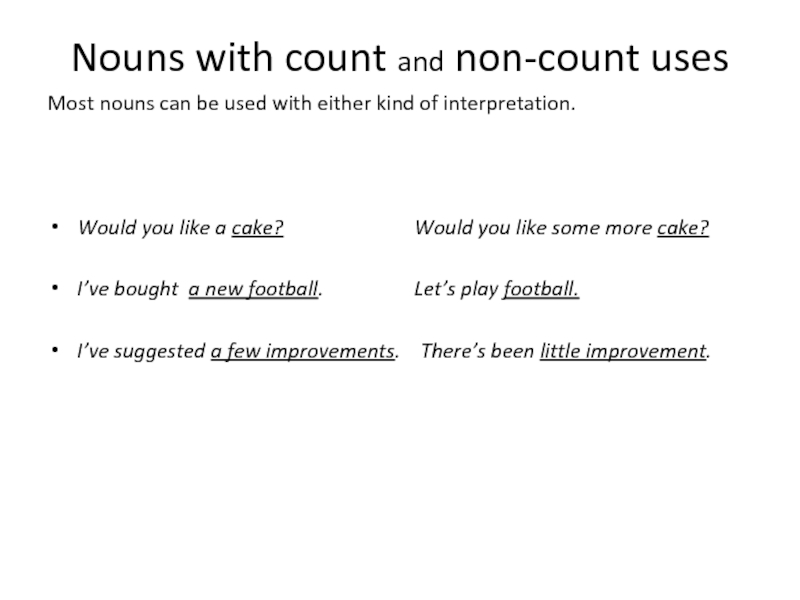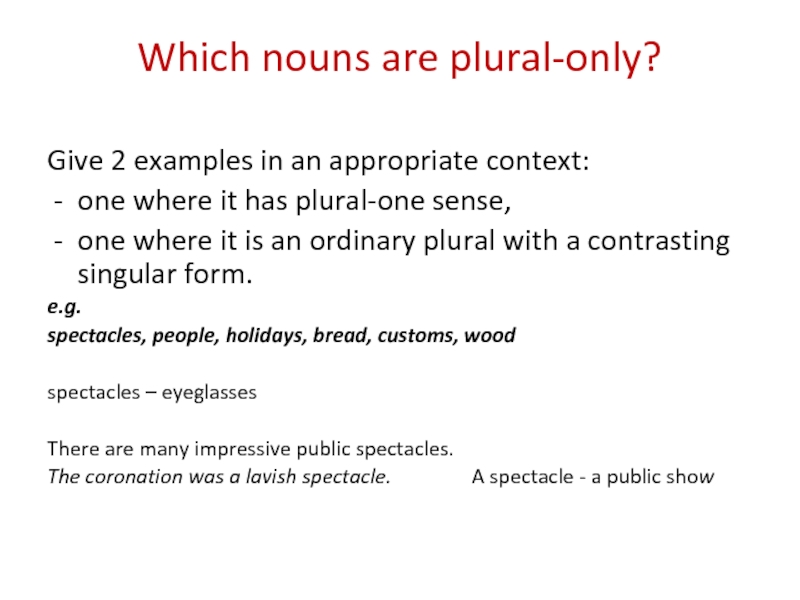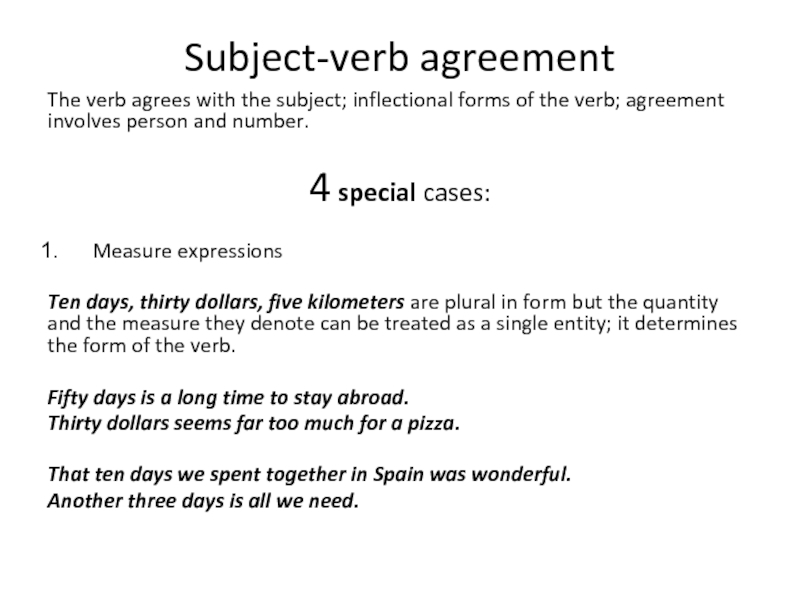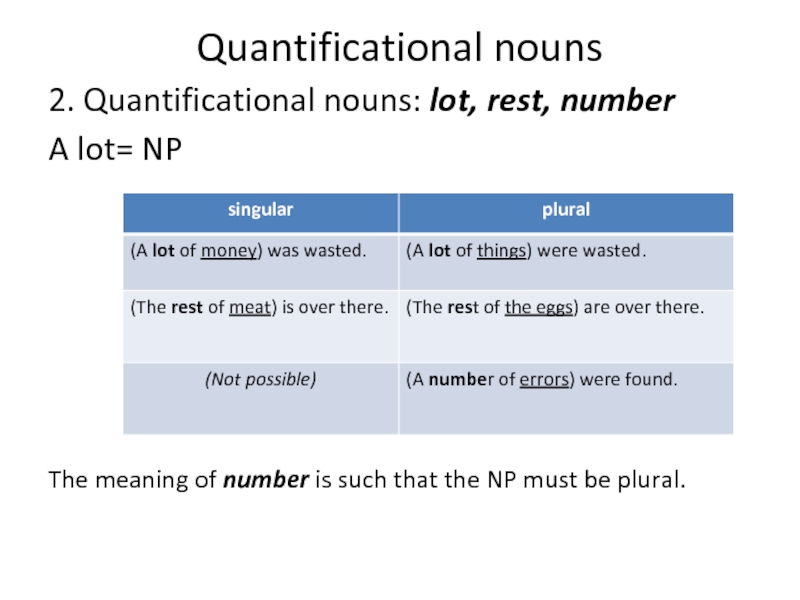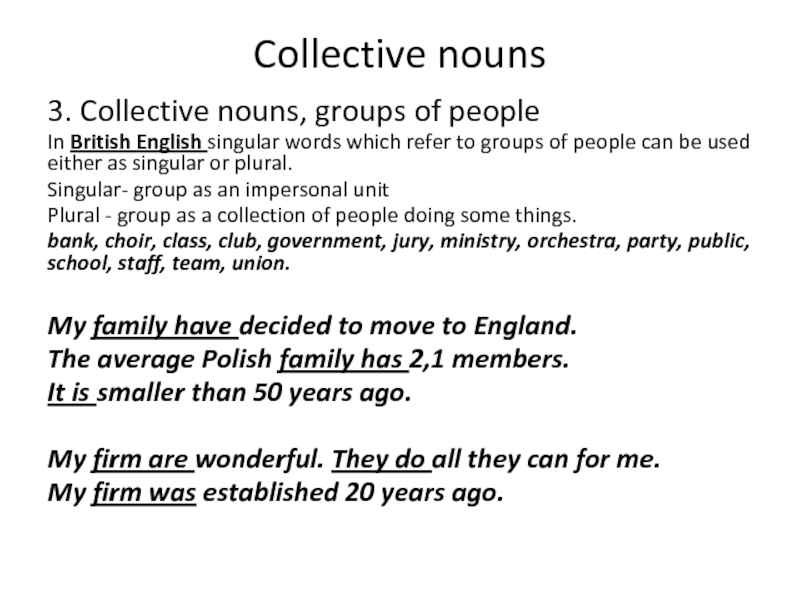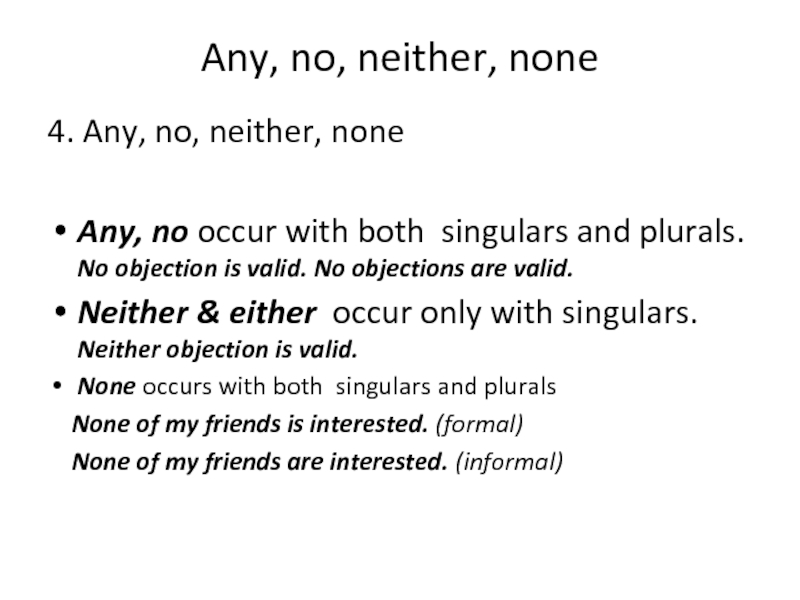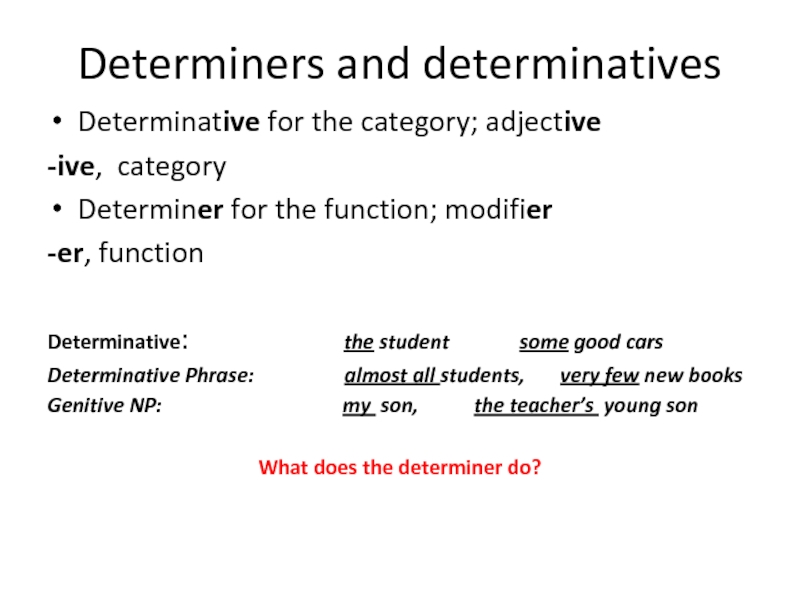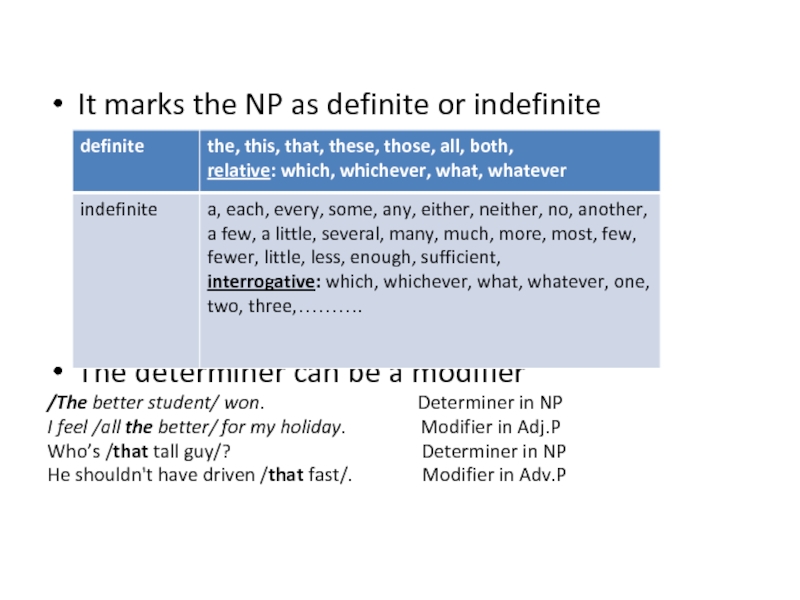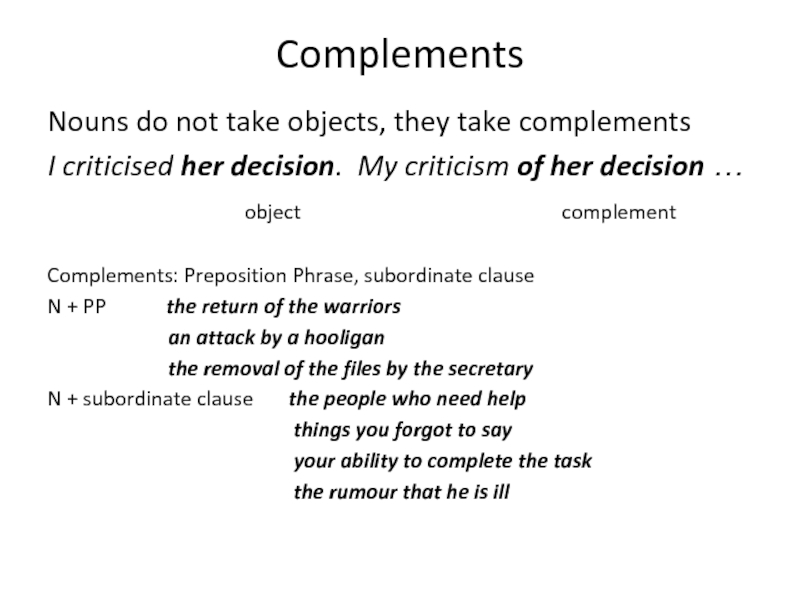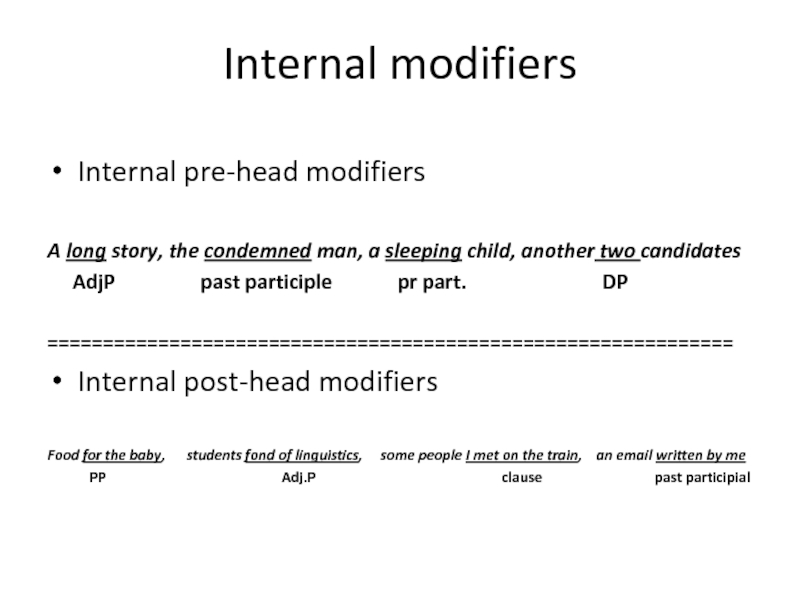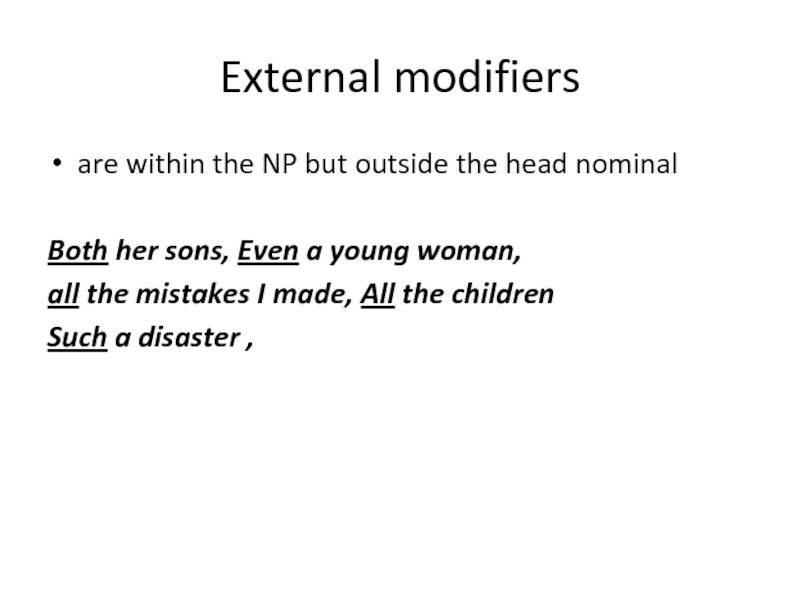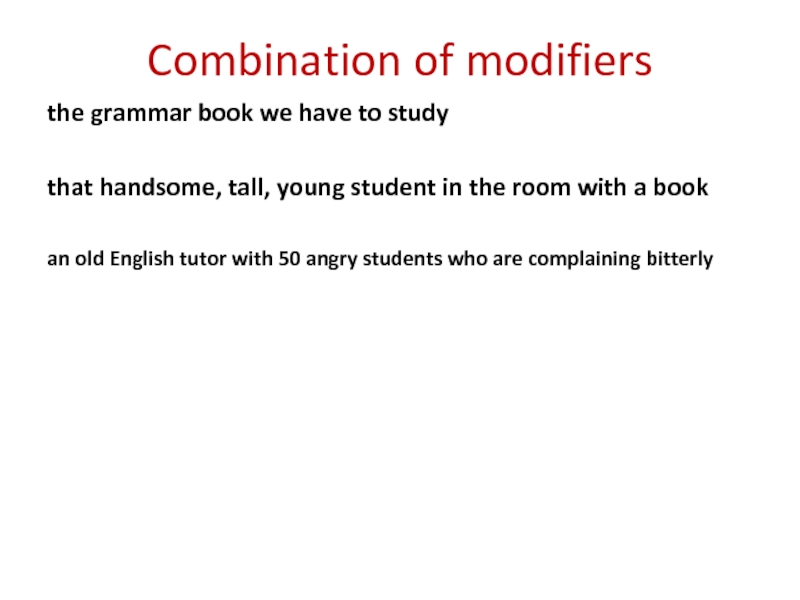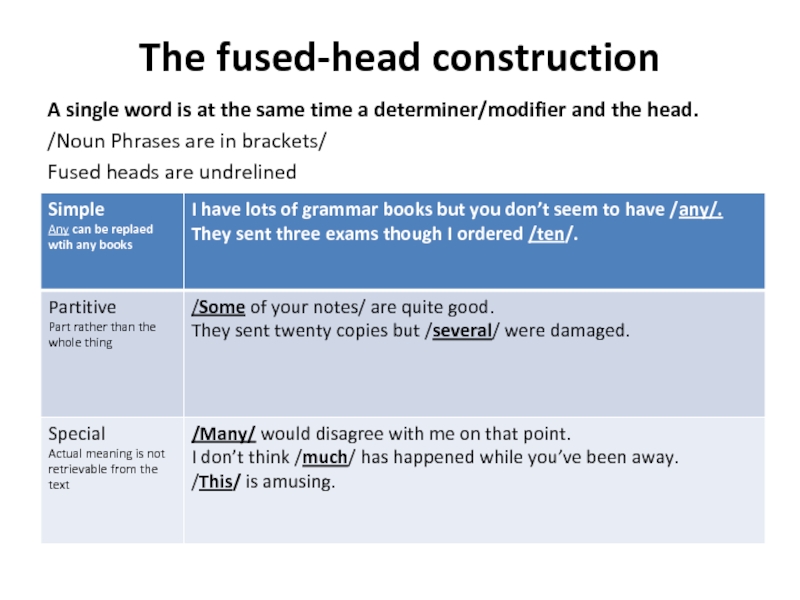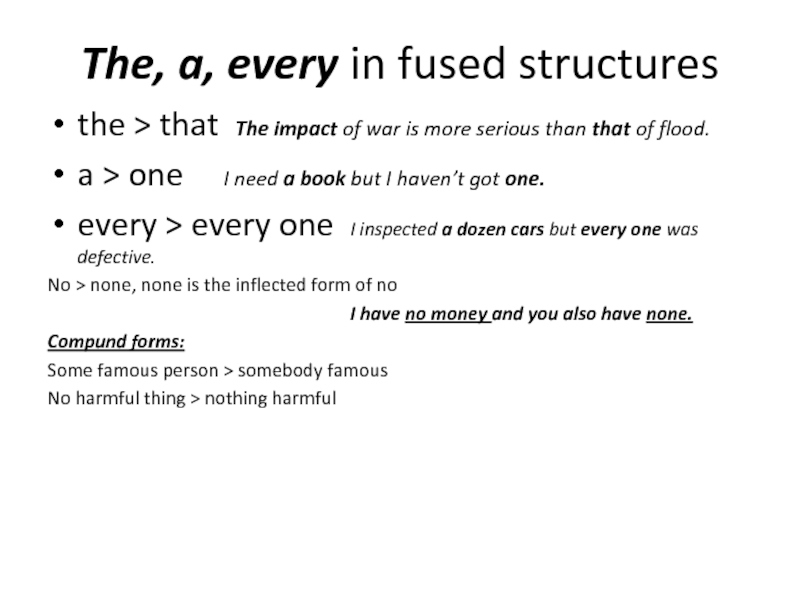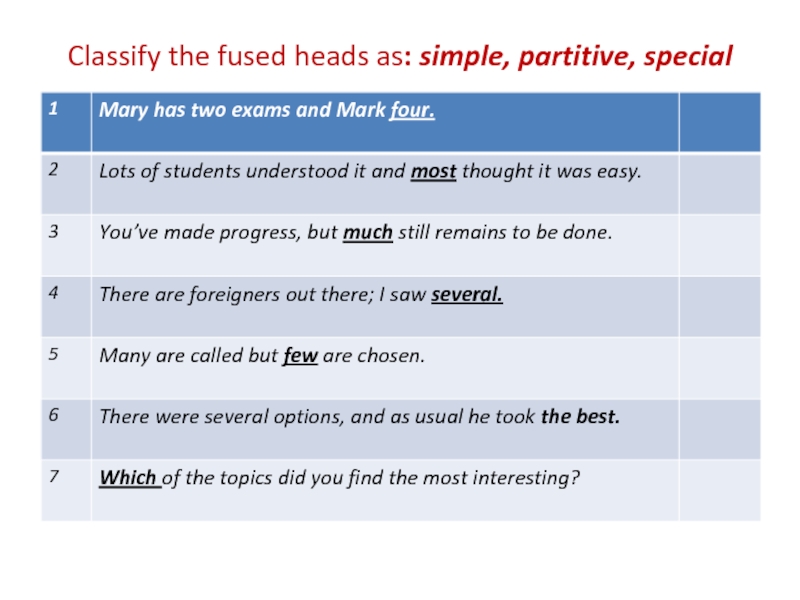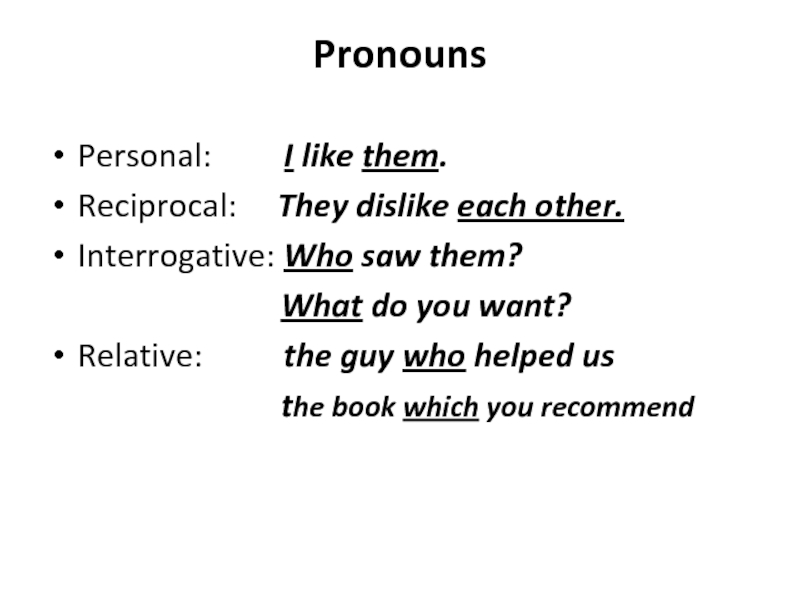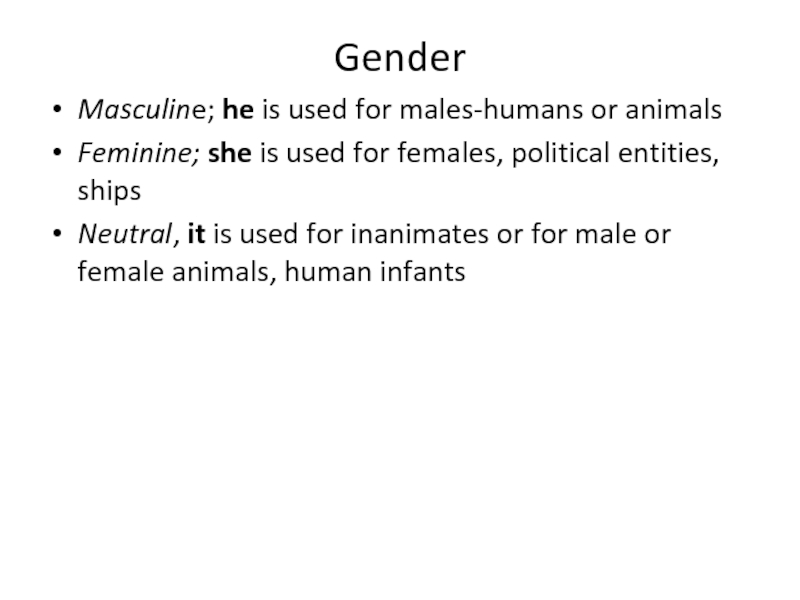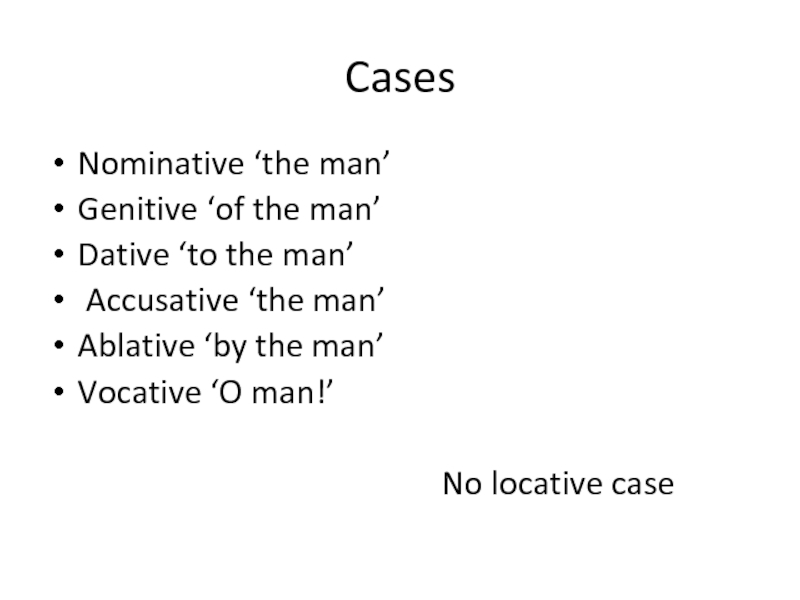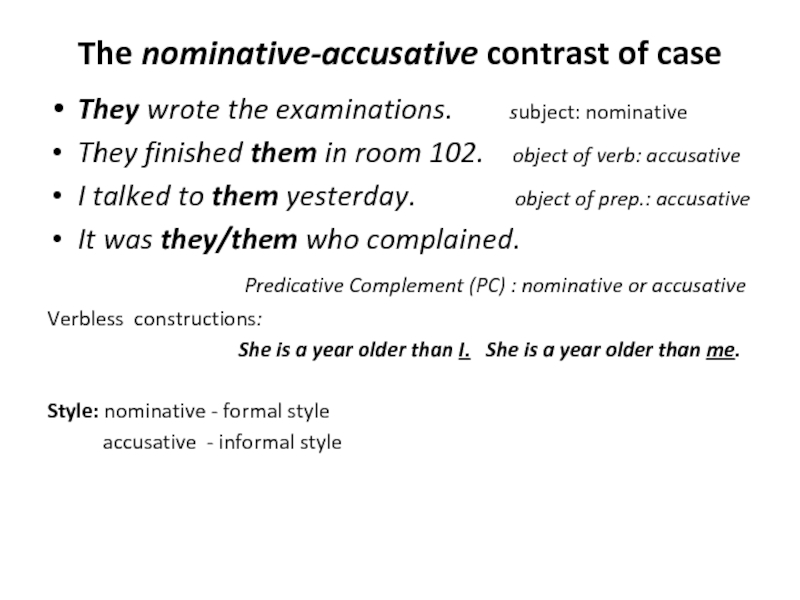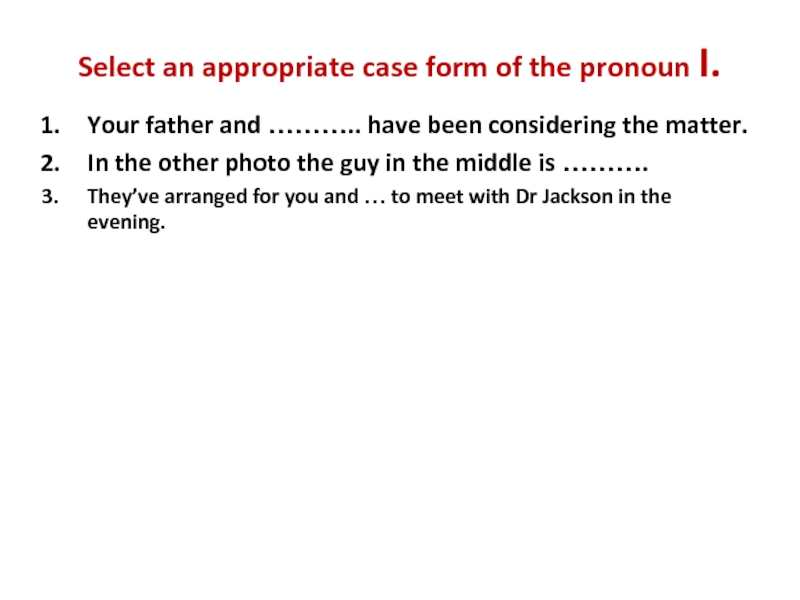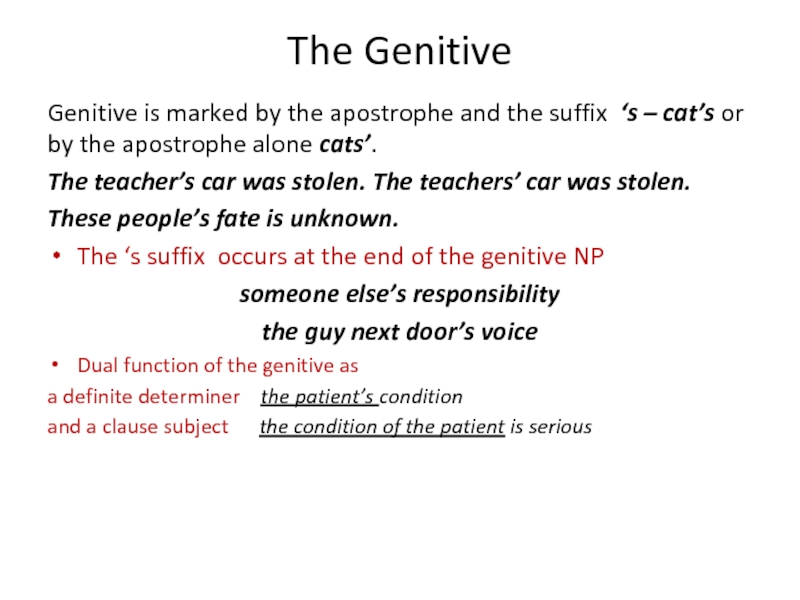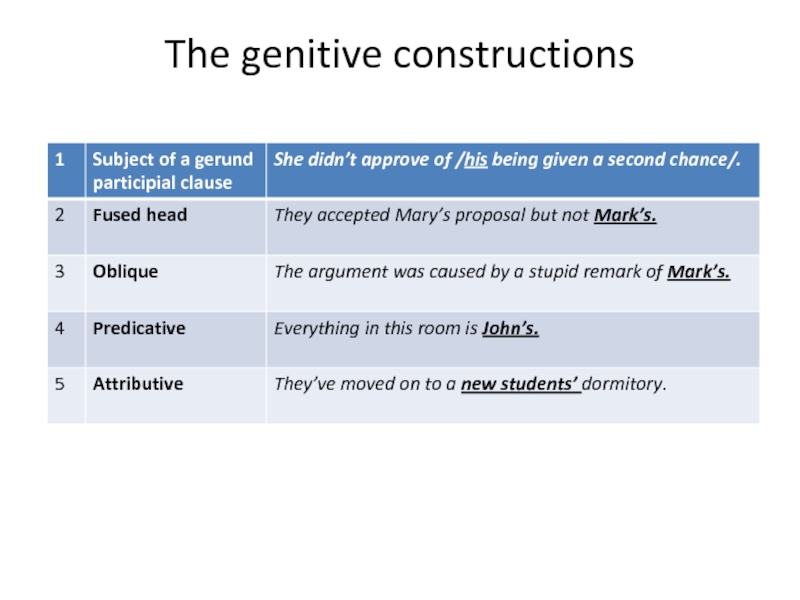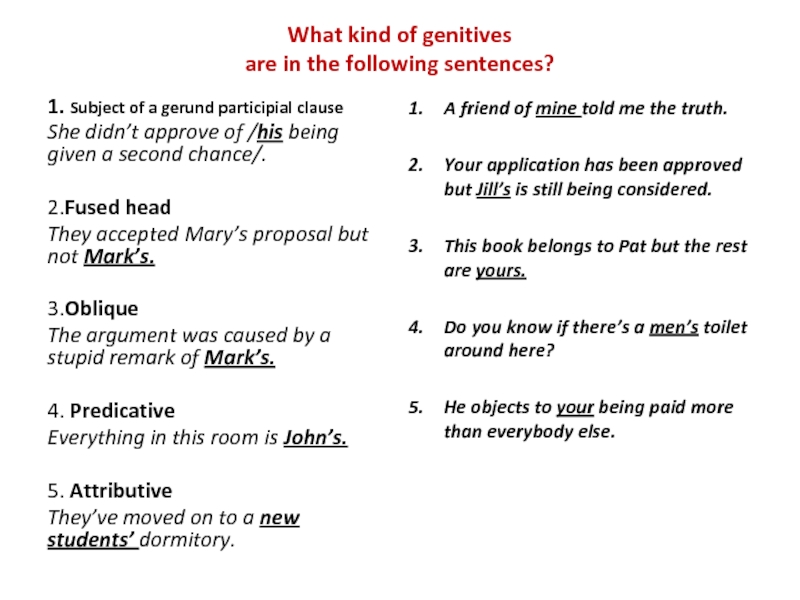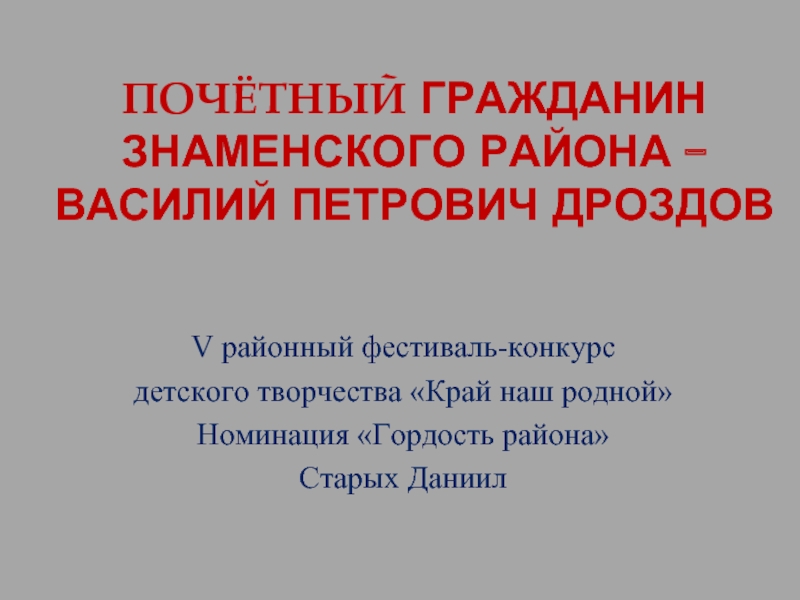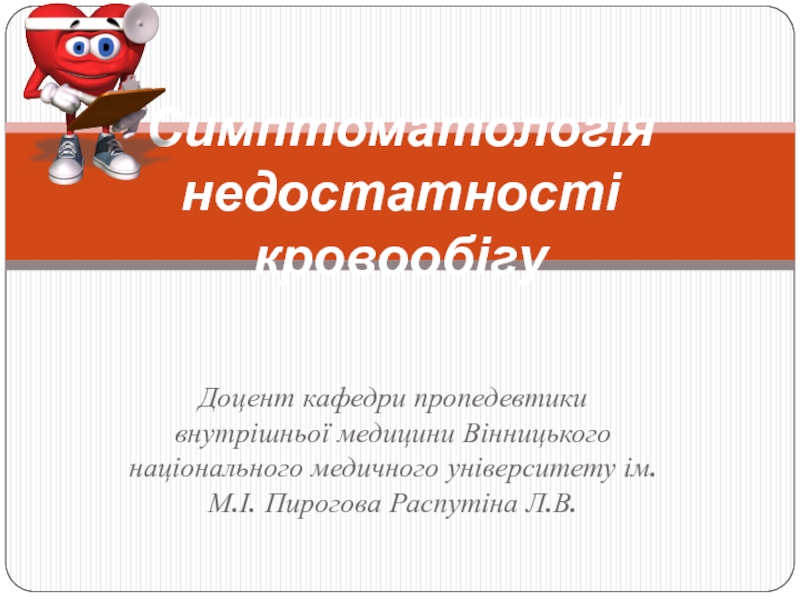Слайд 2N
Noun category includes:
physical objects: people, animals, places, things
substances: grapes, horses,
Warsaw, mother, water
abstract entities: work, hatred, debt, presence
Nouns inflect for:
number (singular, plural)
case (plain, genitive)
Plain : architect architects
Genitive: architect’s architects’
Слайд 3
What are the functions of the NP?
In a clause:
Subject
A new book was published
Object
They published a new book.
Predicative complement It is a new book.
In PP
Complement I am talking to students.
Слайд 5Dependents
They occur exclusively or with nouns as head.
Слайд 7Internal & external dependents
Слайд 8Underline nouns and put NP in brackets:
I have never met
a person who is not interested in languages.
It is the
guy who fainted.
Look at the book he’s reading.
Слайд 9I have never met (a person who is not interested
in languages.)
It is (the guy who fainted).
Look at (the book
he’s reading).
Слайд 10Number: singular & plural;
inflectional forms: cat, cats
Nouns with fixed
number
some nouns are invariably singular:
footwear, harm, nonsense, information,
furniture, money
italics, linguistics, physics, news, phonetics
*Informations are. *Linguistics are boring.
*Money are
or invariably plural
- clothes, belongings, scissors, trousers
cattle, vermin
*This cattle.
Слайд 11Count and non-count nouns
non-count nouns are in minority
Count nouns
take cardinal numerals as dependents.
Count noun:
one chair two chairs.
Non-count noun: *one furniture, *two furnitures
Invariably singular: furniture, clothing, equipment, eagerness, wetness
Count noun: one chair two chairs.
Non-count noun: *one remain, *two remains
Invariably plural: remains, credentials, proceeds, genitals
Furniture , remains cannot combine with any numerals.
Слайд 12Nouns with count and non-count uses
Most nouns can be used
with either kind of interpretation.
Would you like a cake?
Would you like some more cake?
I’ve bought a new football. Let’s play football.
I’ve suggested a few improvements. There’s been little improvement.
Слайд 13
Which nouns are plural-only?
Give 2 examples in an appropriate context:
one
where it has plural-one sense,
one where it is an ordinary
plural with a contrasting singular form.
e.g.
spectacles, people, holidays, bread, customs, wood
spectacles – eyeglasses
There are many impressive public spectacles.
The coronation was a lavish spectacle. A spectacle - a public show
Слайд 14Subject-verb agreement
The verb agrees with the subject; inflectional forms of
the verb; agreement involves person and number.
4 special cases:
Measure expressions
Ten
days, thirty dollars, five kilometers are plural in form but the quantity and the measure they denote can be treated as a single entity; it determines the form of the verb.
Fifty days is a long time to stay abroad.
Thirty dollars seems far too much for a pizza.
That ten days we spent together in Spain was wonderful.
Another three days is all we need.
Слайд 15Quantificational nouns
2. Quantificational nouns: lot, rest, number
A lot= NP
The meaning
of number is such that the NP must be plural.
Слайд 16Collective nouns
3. Collective nouns, groups of people
In British English singular
words which refer to groups of people can be used
either as singular or plural.
Singular- group as an impersonal unit
Plural - group as a collection of people doing some things.
bank, choir, class, club, government, jury, ministry, orchestra, party, public, school, staff, team, union.
My family have decided to move to England.
The average Polish family has 2,1 members.
It is smaller than 50 years ago.
My firm are wonderful. They do all they can for me.
My firm was established 20 years ago.
Слайд 17
Any, no, neither, none
4. Any, no, neither, none
Any, no occur
with both singulars and plurals. No objection is valid. No
objections are valid.
Neither & either occur only with singulars. Neither objection is valid.
None occurs with both singulars and plurals
None of my friends is interested. (formal)
None of my friends are interested. (informal)
Слайд 18Determiners and determinatives
Determinative for the category; adjective
-ive, category
Determiner for
the function; modifier
-er, function
Determinative:
the student some good cars
Determinative Phrase: almost all students, very few new books
Genitive NP: my son, the teacher’s young son
What does the determiner do?
Слайд 19
It marks the NP as definite or indefinite
The determiner can
be a modifier
/The better student/ won.
Determiner in NP
I feel /all the better/ for my holiday. Modifier in Adj.P
Who’s /that tall guy/? Determiner in NP
He shouldn't have driven /that fast/. Modifier in Adv.P
Слайд 20Complements
Nouns do not take objects, they take complements
I criticised her
decision. My criticism of her decision …
object complement
Complements: Preposition Phrase, subordinate clause
N + PP the return of the warriors
an attack by a hooligan
the removal of the files by the secretary
N + subordinate clause the people who need help
things you forgot to say
your ability to complete the task
the rumour that he is ill
Слайд 21Internal modifiers
Internal pre-head modifiers
A long story, the condemned man,
a sleeping child, another two candidates
AdjP
past participle pr part. DP
==============================================================
Internal post-head modifiers
Food for the baby, students fond of linguistics, some people I met on the train, an email written by me
PP Adj.P clause past participial
Слайд 22External modifiers
are within the NP but outside the head nominal
Both her sons, Even a young woman,
all the
mistakes I made, All the children
Such a disaster ,
Слайд 23Combination of modifiers
the grammar book we have to study
that handsome,
tall, young student in the room with a book
an old
English tutor with 50 angry students who are complaining bitterly
Слайд 24The fused-head construction
A single word is at the same time
a determiner/modifier and the head.
/Noun Phrases are in brackets/
Fused
heads are undrelined
Слайд 25the > that The impact of war is more serious
than that of flood.
a > one I need
a book but I haven’t got one.
every > every one I inspected a dozen cars but every one was defective.
No > none, none is the inflected form of no
I have no money and you also have none.
Compund forms:
Some famous person > somebody famous
No harmful thing > nothing harmful
The, a, every in fused structures
Слайд 26Classify the fused heads as: simple, partitive, special
Слайд 27Pronouns
Personal: I like them.
Reciprocal:
They dislike each other.
Interrogative: Who saw them?
What do you want?
Relative: the guy who helped us
the book which you recommend
Слайд 28Gender
Masculine; he is used for males-humans or animals
Feminine; she is
used for females, political entities, ships
Neutral, it is used for
inanimates or for male or female animals, human infants
Слайд 29Cases
Nominative ‘the man’
Genitive ‘of the man’
Dative ‘to the man’
Accusative
‘the man’
Ablative ‘by the man’
Vocative ‘O man!’
No locative case
Слайд 30The nominative-accusative contrast of case
They wrote the examinations.
subject: nominative
They finished them in room 102.
object of verb: accusative
I talked to them yesterday. object of prep.: accusative
It was they/them who complained.
Predicative Complement (PC) : nominative or accusative
Verbless constructions:
She is a year older than I. She is a year older than me.
Style: nominative - formal style
accusative - informal style
Слайд 31Select an appropriate case form of the pronoun I.
Your father
and ……….. have been considering the matter.
In the other
photo the guy in the middle is ……….
They’ve arranged for you and … to meet with Dr Jackson in the evening.
Слайд 32The Genitive
Genitive is marked by the apostrophe and the
suffix ‘s – cat’s or by the apostrophe alone cats’.
The teacher’s car was stolen. The teachers’ car was stolen.
These people’s fate is unknown.
The ‘s suffix occurs at the end of the genitive NP
someone else’s responsibility
the guy next door’s voice
Dual function of the genitive as
a definite determiner the patient’s condition
and a clause subject the condition of the patient is serious
Слайд 34What kind of genitives
are in the following sentences?
1. Subject
of a gerund participial clause
She didn’t approve of /his being
given a second chance/.
2.Fused head
They accepted Mary’s proposal but not Mark’s.
3.Oblique
The argument was caused by a stupid remark of Mark’s.
4. Predicative
Everything in this room is John’s.
5. Attributive
They’ve moved on to a new students’ dormitory.
A friend of mine told me the truth.
Your application has been approved but Jill’s is still being considered.
This book belongs to Pat but the rest are yours.
Do you know if there’s a men’s toilet around here?
He objects to your being paid more than everybody else.
